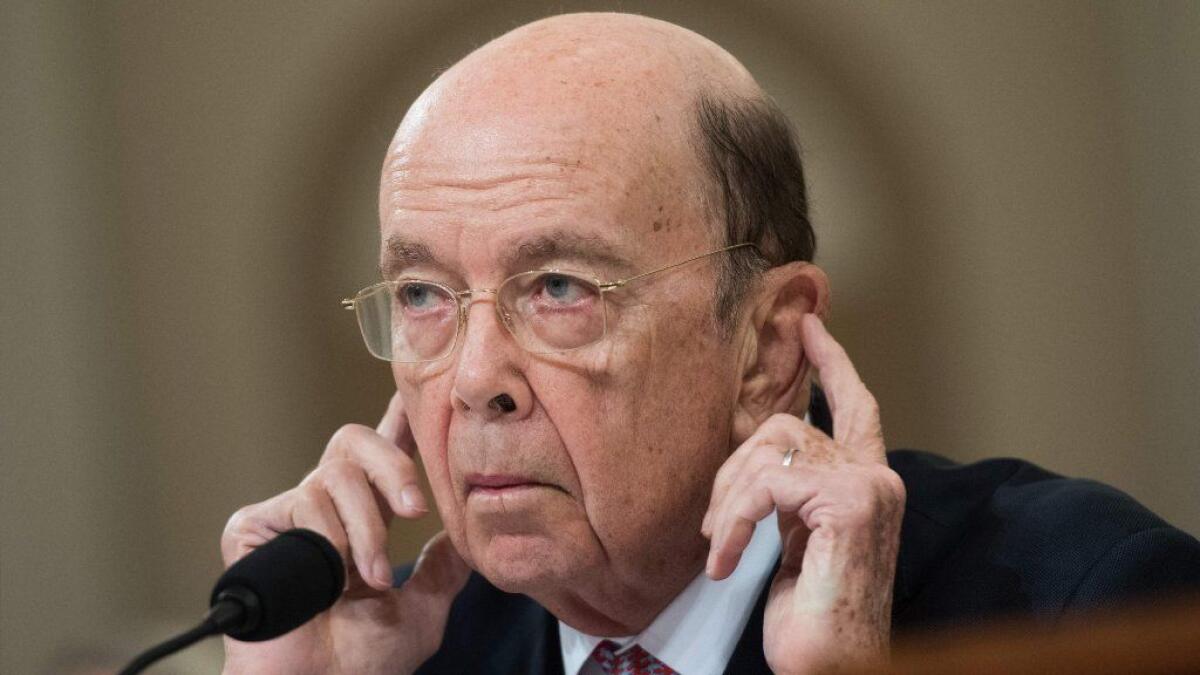Column: Here’s why Wilbur Ross is dead wrong about borrowing money during financial hardship

There have been a number of really great let-them-eat-cake moments as prominent conservatives have defended President Trump’s government shutdown by telling 800,000 paycheck-lacking workers to just suck it up.
First came Lara Trump, the president’s daughter-in-law, shrugging off weeks of unpaid work as “a little bit of pain” that’s a small price to pay for a multibillion-dollar, taxpayer-funded border wall.
“Listen, it’s not fair to you, and we all get that, but this is so much bigger than any one person,” she said. “It is a little bit of pain, but it’s going to be for the future of our country.”
Then came Commerce Secretary Wilbur Ross, who said Thursday that he doesn’t “really quite understand why” federal workers didn’t just take out loans to cover little, incidental expenses such as, you know, rent, mortgages, food, healthcare, stuff like that.
He was asked what he made of reports that furloughed federal workers were turning to food banks and homeless shelters to survive the shutdown.
“Well,” Ross answered, “I know they are and I don’t really quite understand why because as I mentioned before, the obligations that they would undertake, say borrowing from a bank or a credit union, are in effect federally guaranteed, so the 30 days of pay that some people will be out is no real reason why they shouldn’t be able to get a loan against it.”
The 81-year-old former investor, who says he’s worth about $700 million (after previously claiming to be worth billions), proceeded to dig his hole deeper.
“Now, true that people might have to pay a little bit of interest,” he said, “but the idea that it’s paycheck or zero is not a really valid idea.”
Because what’s a little interest on an undesired loan if it helps Trump spend billions on a project that most experts say wouldn’t work?
Linda Sherry, director of national priorities for the advocacy group Consumer Action, called Ross’ comments “outrageous” and “sickening.”
“This guy is unbelievable,” she told me. “What he’s saying, that you should borrow more, is exactly the route you shouldn’t take when you face financial trouble.”
OK, I’m not here to ridicule the president’s obsession with archaic medieval defenses.
Nor am I out to make the commerce secretary and Eric Trump’s lovely wife seem cruelly heartless toward working families.
But Ross’ blithe attitude toward consumer debt serves as a teachable moment, for both the administration and hard-pressed workers.
The undeniable fact is that Americans are borrowing record sums of money, and this makes an increasingly large number of households vulnerable to financial catastrophe in the event of unforeseen difficulties.
Non-mortgage consumer debt, including credit cards, auto and personal loans, probably will top $4 trillion this year, experts say.
Credit card debt alone already surpasses $1 trillion, with the average U.S. household carrying a balance of just under $7,000.
The average interest rate on all that plastic is more than 17%.
We hit the $3-trillion level of non-mortgage consumer debt in 2013. It took just five years to tack on an additional trillion bucks to that mountain of IOUs.
“This shows we’ve all been feeling pretty confident in the past year,” Sherry said. And that’s not necessarily a bad thing.
Consumer spending accounts for more than two-thirds of U.S. economic activity, so all that confidence translates to economic growth, which can mean jobs, homes and all sorts of other things that society desires.
The trouble comes when our level of borrowing moves from healthy investment in ourselves to a risky overextending of financial resources.
“What we’re seeing now is similar to what we saw in 2008,” Sherry said, highlighting the staggering consumer debt levels seen, particularly in the mortgage market, before the Great Recession.
The wave of foreclosures and personal bankruptcies that followed took a grim toll on the nation.
“People need to realize that paying as you go is really, really important,” Sherry advised.
As is trying as hard as possible to maintain funds for a rainy day. This is obviously a challenge for many individuals and families living paycheck to paycheck, but it’s not nearly as tough as trying to meet the onerous terms of a payday lender, or keeping debt collectors at bay.
Federal workers caught in the shutdown crossfire have no easy options. They need to make ends meet amid circumstances beyond their control.
However, running up a bar tab just so a certain someone can score points with his base, that’s not exactly a sound rationale for sacrifice.
Ross dismissed the hardship federal employees are facing as “a great deal of hyperbole.”
“Put it in perspective,” he said. “You’re talking about 800,000 workers. And while I feel sorry for the individuals that have hardship cases, 800,000 workers — if they never got their pay, which is not the case, they will eventually get it — but if they never got it, you’re talking about a third of a percent on our GDP. So it’s not like it’s a gigantic number overall.”
This from a guy who bragged last year about having helped save about 3,000 coal-mining jobs.
A guy who once reveled in being known as the “king of bankruptcy” thanks to his track record of swooping down on troubled companies, buying them for a song and then turning them around for big bucks.
Ross can’t quite understand why federal workers aren’t lining up at the bank to borrow money as they’re forced to work for no pay.
The president’s daughter-in-law doesn’t see why workers won’t stomach a little hardship for the sake of the administration’s political success.
Here, have a slice of cake. Take two.
David Lazarus’ column runs Tuesdays and Fridays. He also can be seen daily on KTLA-TV Channel 5 and followed on Twitter @Davidlaz. Send your tips or feedback to david.lazarus@latimes.com.
More to Read
Get the L.A. Times Politics newsletter
Deeply reported insights into legislation, politics and policy from Sacramento, Washington and beyond. In your inbox three times per week.
You may occasionally receive promotional content from the Los Angeles Times.











